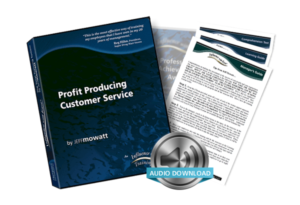How to Collect from Late Paying Customers
Nine tips for getting paid without creating hard feelings
 Ever experience the awkwardness of having to call a customer to remind them to pay their bill? You walk a fine line of diplomacy. Being a pushover won’t get the customer’s attention. Being too pushy can offend risking losing not only money that’s due, but future business as well. Most of the training I do is on choosing words that enhance trust and differentiate your service to make price less relevant. You can use these same trust building principles to gain cooperation with customers who aren’t paying. Consider these nine tips…
Ever experience the awkwardness of having to call a customer to remind them to pay their bill? You walk a fine line of diplomacy. Being a pushover won’t get the customer’s attention. Being too pushy can offend risking losing not only money that’s due, but future business as well. Most of the training I do is on choosing words that enhance trust and differentiate your service to make price less relevant. You can use these same trust building principles to gain cooperation with customers who aren’t paying. Consider these nine tips…
1. Do your homework
Start by gathering details about the invoice and about how much overall business the customer does with you. Any large volume customer isn’t going to be happy about receiving a collection call over a relatively small invoice. In fact they may rethink continuing to do business with you. On the other hand, a first time customer with a large overdue bill should be contacted sooner rather than later. When it comes to collecting, it makes sense to give long term customers special consideration.
2. Begin with a courtesy email
The first reminder can be a friendly email sent soon after payment is due. Keep the tone light and conversational: “Pat, I was looking through our receivables and noticed we haven’t received a payment yet on this invoice. I want to make sure you did indeed receive it and there’s nothing you need from our end. Thanks.”
3. Stand up for yourself
If the email doesn’t receive a reply, it’s time to pick up the phone. If you’re feeling anxious, stand up when you phone. Your voice will have more resonance and authority, and you feel more confident and in control.
4. Share facts not accusations
Certain phrases can inadvertently sound like accusations that put customers on the defensive. Telling people they are late or overdue sounds like a generalization. Instead give specific dates and encourage them to talk, “Payment was due on the 17th and as of today we haven’t received it. Is there something about the payment I should be aware of?” Listen. Gather facts. Take notes. This isn’t the time to state your position. Instead, summarize you’re understanding of the facts you collected. “So if I understand this correctly, the situation at your end is…?” A huge part of building trust with anyone is demonstrating that you get their circumstances.
5. Empathize
After you’ve summarized your understanding of their situation, if they have indeed been experiencing financial setbacks, then empathize. Begin with two magic words: sounds like. “Sounds like you’ve had a run of unfortunate events. I’m sorry to hear that.” Those words make you sound humane and go a long way towards making late paying customers want to cooperate.
6. Don’t make it personal
This is the opposite of what I normally share in my Trusted Advisor seminars. Typically, we personalize the service by using the word “you”, as in, “Let me check for you.” In the case of collections however, the last thing we want is for this to be taken personally. So rather than asking, “When can you pay?” Instead ask, “When can we expect payment?” Speaking of word choices, avoid asking if they “want” to pay by installments. Few people want to pay bills. Instead ask, “Would it be helpful if we set up a payment plan?”
7. Express your Grand Intention©
If you are indeed dealing with a normally reliable repeat customer, explain that you value their business and want to help them through this. I call it expressing your grand intention. It sets a positive tone and implies that you’re interested in achieving a long-term mutually positive outcome. Again, the goal is for them to feel motivated to pay.
8. Summarize your understanding
Before hanging up, clarify what you and the customer have decided, “For my notes and to make sure I have everything clear, here’s what we’ve agreed upon moving forward…” Then send them a written summary confirming what you discussed. That way if you end up in court you’ll have documentation.
9. Last resorts
If you conclude there’s slim hope of collecting all monies or that you no longer want to continue doing business with that customer, consider settling for less than the full amount. In most cases, you’ll be further ahead financially than what you’d receive by either suing them or engaging a collection agency. Speaking of unpleasant customers, some business owners have told me they meet once a year with their staff to ‘fire’ their one or two worst customers. These are individuals who create more stress than they are worth. In that case they send the customer a letter along the lines of, “It appears you have not been satisfied… we are therefore asking that in future you use the services of (competitor).”
Bottom Line– While phoning customers to get paid may be daunting, fortunately by simply being a strong listener and choosing your words more thoughtfully, you can make collecting from customers less unpleasant and more rewarding. Good luck!
Was this helpful? You’ll find more of Jeff’s Business Building tips on Influence and Persuasion Skills

Influence with Ease – You already know that whatever your message, customers and coworkers are persuaded – not by your title – but by how much they trust you. Jeff shares 30-second tips that strengthen trust in virtually all of your communications.
 “How to Deal with Difficult People”. Whether at work or at home, a difficult person can make your life miserable. The emotional distress caused by an unpleasant customer, co-worker, or even family member can leave you feeling drained. Sometimes it feels like you’re the only one making an effort. When what you try doesn’t work you may find yourself wanting to escape. What if there was a better way to prevent and resolve conflicts?
“How to Deal with Difficult People”. Whether at work or at home, a difficult person can make your life miserable. The emotional distress caused by an unpleasant customer, co-worker, or even family member can leave you feeling drained. Sometimes it feels like you’re the only one making an effort. When what you try doesn’t work you may find yourself wanting to escape. What if there was a better way to prevent and resolve conflicts?
Profit Producing Customer Service in today’s competitive marketplace your team’s customer service is often your greatest differentiator. The challenge is ensuring that everyone gets consistent training on how to deliver one-of-a-kind service, where price becomes less relevant. This training package reveals how employees can provide REMARKable service.
in today’s competitive marketplace your team’s customer service is often your greatest differentiator. The challenge is ensuring that everyone gets consistent training on how to deliver one-of-a-kind service, where price becomes less relevant. This training package reveals how employees can provide REMARKable service.
You can find more of Jeff’s training resources under Shop or should you be interested in having Jeff present a customized presentation for your organization contact Jeff at [email protected]

